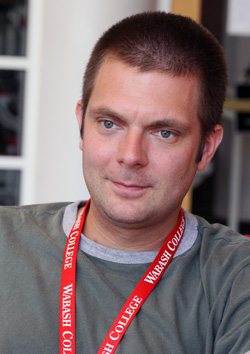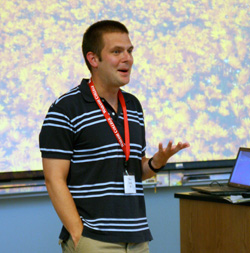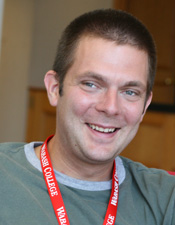In many ways, Mark Doyle ‘98 pursued a conventional academic path for a biologist. He studied biology as an undergraduate at Wabash. He received a PhD in molecular biology in 2004 from the University of Wisconsin at Madison. And presently, he conducts post-doctoral research on plants at his graduate school alma mater. But Doyle, like other students, made a few unconventional detours to his present destination.
 For nearly ten years, Doyle has dedicated significant personal and professional time to volunteerism, community service, and mentoring, which has taken him to interesting places all over the world.
For nearly ten years, Doyle has dedicated significant personal and professional time to volunteerism, community service, and mentoring, which has taken him to interesting places all over the world.
"During grad school I started doing volunteer work," said the 32-year-old native of Mendota, Illinois. "Communication is really important in science. It’s sort of an isolated community. You don’t really interact with ‘people.’ You are in your laboratory environment, and you spend a lot of time there. So I thought it’d be a nice way to branch out from the lab to do some volunteer work."
But what began as after-school tutoring at the local Boys and Girls Club in Madison expanded to a commitment to service well beyond the city limits and national border.
"I also got involved with a program that takes used eyeglasses to countries in Latin America to do free eye exams and distributes glasses," Doyle said, referring to I Care International. "With that and the Boys and Girl Club, I just thought, ‘when I was finished [with grad school], I should volunteer full time.’ "
Doyle’s idea of full time volunteerism led him to apply for a position in the Peace Corp in February 2004. In September, he departed for upper Majeakgora, a 200-300 person village in South Africa. Doyle’s responsibility as an educational research volunteer was to assist teachers at Kgmotso High School in Pampierstad in implementing a new curriculum. He and other volunteers encountered difficulties. Many teachers were not interested in adapting to the new outcomes-based methods, and the government was not interested in making the teachers accountable.
 "I ended up trying to work on science education in general," Doyle said, acknowledging that many teachers were chosen by the government and teaching was not their choice career. He tried to tie his background in science to the new curriculum in hopes that something would connect.
"I ended up trying to work on science education in general," Doyle said, acknowledging that many teachers were chosen by the government and teaching was not their choice career. He tried to tie his background in science to the new curriculum in hopes that something would connect.
"I tried to show teachers that they could do active experiments with students with very minimal equipment and still have a very meaningful message," Doyle said. "That they could make science hands-on in the classroom."
Doyle said he became discouraged at times. He too had to adapt to being in a different place, where people had different ways of conducting business. He worked on learning the language. He grew to accept the expectation of opening workshops with prayers and closing with a song. He got used to meetings beginning thirty to forty minutes late. He also accepted his own limitations.
"Let’s face it. For me, as a white American in South Africa, there’s a limit to how much I can inspire in a rural, poor black community," said Doyle, who admitted there were times where he felt hopeless during his two years witnessing the racial tensions, HIV infections, and a poor education system. What kept Doyle motivated were those he called the "winners."
"It’s the high school kid who still comes to your house every night for help with math," he said of his friend Thato Modisane, with whom he still keeps in touch. "It’s these few people who want to start businesses and want to do all the legwork required. You find these little gems. In a hopeless place like that you want to go out and find a winner, a hero. You need to find the winners, and empower them, and let people do things their own way."
 Doyle’s attentiveness to other people’s progress can be seen in his current research as well. He is studying how a plant’s flowering time is affected by its outside environment. Doyle, who spent summers in Illinois detasling beans, deals with genetics using a sophisticated plant model system, Arabidopsis, which is closely related to broccoli and cauliflower.
Doyle’s attentiveness to other people’s progress can be seen in his current research as well. He is studying how a plant’s flowering time is affected by its outside environment. Doyle, who spent summers in Illinois detasling beans, deals with genetics using a sophisticated plant model system, Arabidopsis, which is closely related to broccoli and cauliflower.
Two undergraduates work in the lab with him. They have their own research projects, but they go to Doyle for guidance. He enjoys assisting them.
"I try to get them to come up with their own ideas," Doyle said. "It’s very fulfilling to see people succeed probably as a result of something you gave them in the lab. I really have high hopes for one of these undergrads. I think she’s really going to take off. Well, she already has in my opinion."
Doyle, who may become a teacher or do government research, said his concern for others and his social conscience are part of his personality and his upbringing. He said his Midwestern background did not include a lot of money, but he was never poor. He gets upset when he sees inequality, and he believes there is much more to be done to make sure everyone has the same opportunities. Doyle’s belief in promoting equality and opportunity is what led him to help students in his own city and to those at the edges of distant continents.
Doyle credits Wabash with teaching him how to think and learn on his own, which he said has been of great value in graduate school. Having lectured at a large university, he said he has developed more appreciation for smaller institutions.
"I always encourage Wisconsin students to get into a research lab early because I think that’s the big advantage at a big school like that," said Doyle, who heard of Wabash from family and friends. "At Wabash I think the advantage is largely in the classroom, with the ability to interact in this small yet interesting environment. We’re putting the readings and everything together now for a course that could be much like discussion-based courses at Wabash. I’m really excited to see how this plays out."